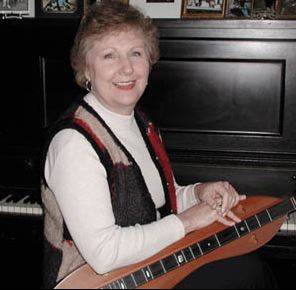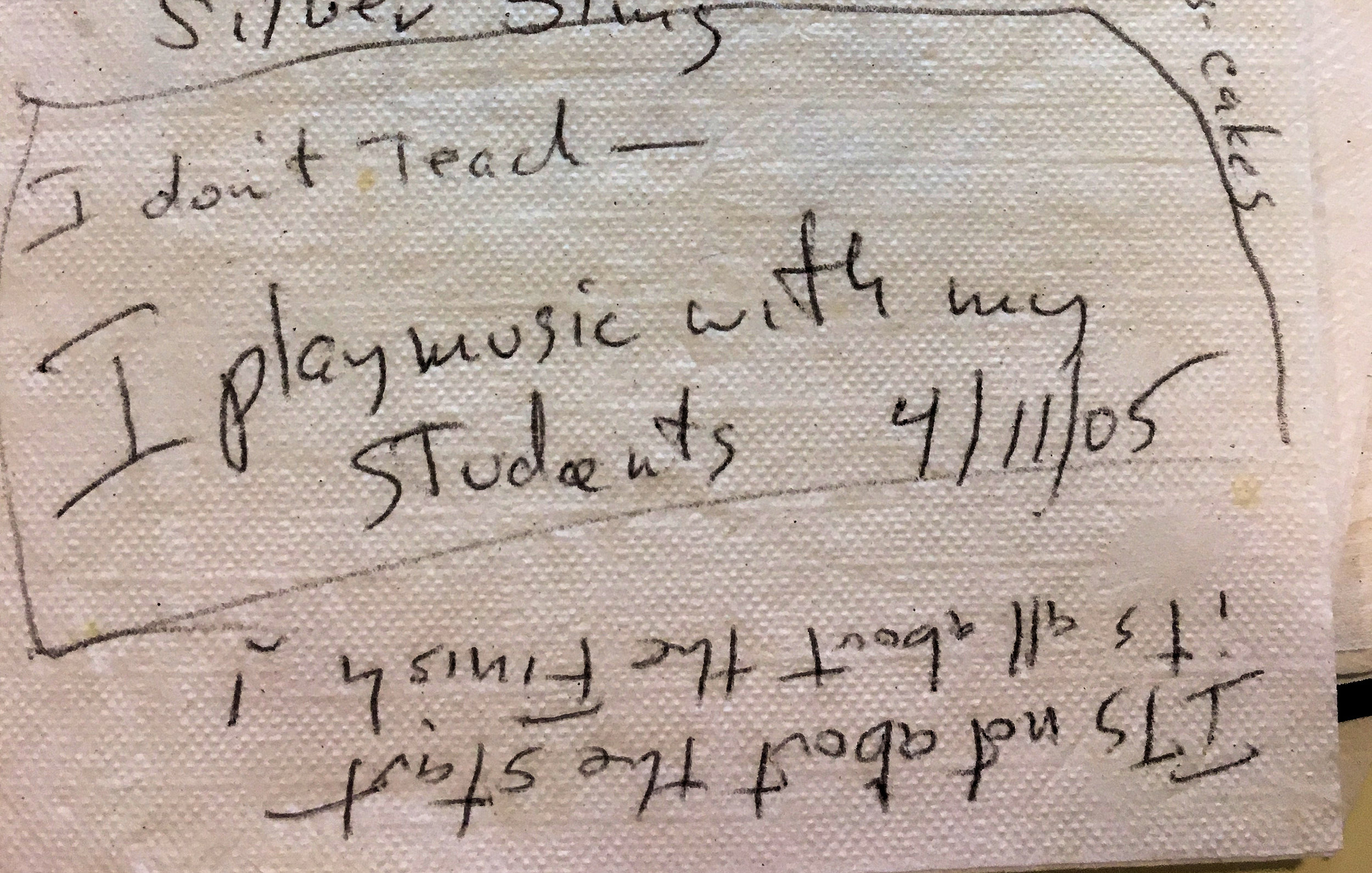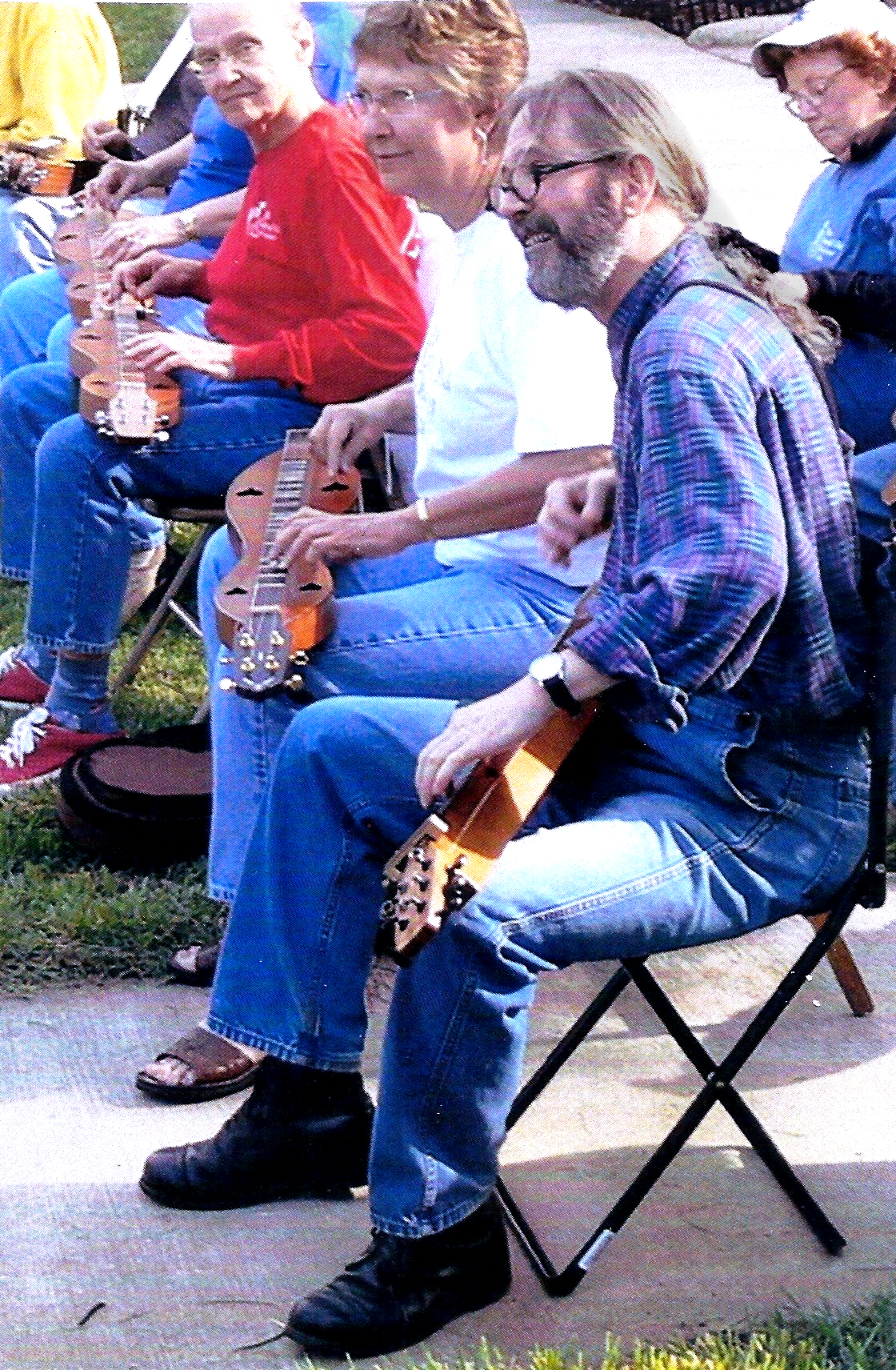David Schnaufer (1952-2006): The Founding Spirit behind the GODC. Read excerpts from his Biography now by clicking here: Amazon
Photo courtesy of Kelly Love. Please do not reproduce without permission.
The Late Jerry Wright's Interview with David Schnaufer
We were in Covington, Louisiana at the Mardi Gras Dulcimer Festival in 1997. I had just heard David Schnaufer and Steve Seifert in concert. I had just experienced some of the best music that I had ever heard in my life. People were all around David. I had asked him for an interview earlier in the day. He saw me. He walked over to the side and we sat in a couple of chairs. I had a little tape recorder. The man was so easy to talk to – after all, he is a fellow East Texan.
I have lived in Nashville, Tennessee for 14 years but I was born in Hearn, Texas. I was born in a building that is now the Western Auto – in fact I don’t even know if it is still there – that little old town has fell on hard times. I lived in Franklin a little bit then moved to LaMarque, Texas. That’s where I really grew up. My folks were from Tennessee Colony near Palestine, Texas.
I got a Jew's harp for my 5th birthday. My dad taught me how to play that and then sometime later, I started playing the harmonica. But I never was any kind of musician or anything, I just kinda made noise you know and stuff. And when I was 20, I started kinda thinking about playing music. Emmy Lou Harris and Graham Parsons played in Houston one night. And I knew – that is when I was 20 and that is when I knew that I wanted to play music. So I went looking for something with strings. I did a little autoharp, I tried that for – you know – a day. And guitar, well, I knew that wasn’t my thing. I was going to school at Sul Ross out in Alpine, Texas. I was visiting a friend in Austin one weekend and I went past a music store and the whole front was full of instruments that I had never seen before – they were dulcimers. They were $40. So I bought one of those. It was my 21st birthday so that was in September of ’73. I started playing and I went back out to West Texas and I couldn’t get away from the dulcimer. I’d play in the morning and I would try walking back up that mountain to go to school and I’d get half way up and I would turn around and run back down. I didn’t know what to do with it – I didn’t know how to tune it or anything. My brother was a priest in Georgetown. So I would hitchhike from Alpine, Texas all the way across the state for my brother to tune my dulcimer and then I’d just, “See ya, I gotta get back.” He played the guitar – my brother was the musician in the family. He was always a good clarinet player. So, he tuned it up for me – I made a couple of them long hauls and so I quit school about two weeks after I started playing music. And I went and saw my brother and that is when I started working in construction and to be around my brother so he could tune my dulcimer for me until I learned how to do it. And I just been playing ever since.
Nobody heard me play for about the first year or year and a half that I played. In 1976, I saw an ad for Winfield, they were having a dulcimer – the first national dulcimer contest. But it wasn’t the Winfield in the Fall, it was one that they had in the Spring. They had it just one year. So, I went there to listen. I was playing out in the parking lot just by myself and talking with some dulcimer people. A fellow named Roger Harris from Oklahoma City, he entered me in the dulcimer contest. I’d never played in front of anybody and so I entered in the dulcimer contest and I won. I only knew three tunes but I played those three tunes for a year and a half. I had Golden Slippers down, Santa Anna’s Retreat, I had that down. I won that then went back working construction in Keller, Texas – just north of Ft Worth. Then during the rainy season, I would take off hitchhiking looking for dulcimer players. I’d find out the names of a dulcimer player, I’d call them up and go see them. Or, I’d just show up, I’m not much of a phone person. I’d just show up and say, “You wanna play some dulcimer?” So I went all over the country meeting … I went up to the Northwest – I met Bob Force and Albert D’osshe and went all over the mountain areas in the Carolina and West Virginia. I chased it down, I think I knew every dulcimer player there was. Then at that same time, the first Cosby Dulcimer Festival happened. You know, that was the first convention where dulcimer players had ever got to meet each other. Most of the people were in their early 20’s so there was a lot of energy going on. That was in either ’75 or ’76 – that first Cosby – I met a lot of people and got to hear a lot of dulcimer styles from all over.
I met Bonnie Carol there and I moved out to Colorado and built dulcimers with her. We had a shop out there for three years and traveled around and played. I learned a lot of stuff from her. And from a classical mandolinist that was a friend of mine who was teaching me stuff. We ended up playing as a trio, me and Bonnie and her. We traveled the West Coast and East Coast and after that, I moved to Washington D.C. and was going to teach out there but that wasn’t going very well and so I ended up in West Virginia with Alan Freeman who I had met at a craft fair up in Pennsylvania a couple years before. My car died out on his farm and so – and he knew all the old banjo players and fiddle players, all the old time traditional players. So I got to pick with them all the time I lived out there – about four years or so. And then, I moved back to Texas a few times during that time period. I can’t stay away – I’m always going back to Texas.
I did a little EP and decided that I was going to move to Nashville. An EP is the size of a 45 rpm record but it has four songs on it instead of two and it runs at 33 1/3rd. I thought it would be perfect for folk music cause you could put four songs on it. So I did that and moved to Nashville. I had been writing Chet Adkins’ office for years cause I loved Chet’s playing. I called him up one day and I talked to his secretary and she said, “If you really want to do this, you ought to move to Nashville.” I had already been there once, I went to the Opry and saw Earnest Tubb and Kitty Wells.
So I moved to Nashville and started playing in restaurants for tips. I had always written songs so Nashville is a song town, so then I started playing with the Judd’s. They were the first people – they had just made the scene. I played the dulcimer, the second album, I played for their next four albums. Then through that, I hooked up with Polly Dunn and Kathy Mattea and Dan Steels and lots of different country artist like Michael Murphy. A lot of these people had heard me play in clubs or – I played every gig I could possible play.
And then, let’s see, then I got a publishing deal so I didn’t have to work so hard for rent. That meant that I was getting paid to write songs. So that was pretty neat. Let’s see, it’s been twelve since I’ve had – I’ve been totally making my living making music. Then I was in a rock band this whole time, a country rock band. We did acoustic kind of rock. We got a big major label record and stuff. And that all went totally crazy and I ended up living back in my car on the streets.
Then the university hired me. I played at a dinner party and the dean heard me play and he said, “I want you at our classical music school.” So I’ve been over there for three years now. And that kinda brings us up to date.
Sandy Conatser
Steve’s* grandmother had given him a dulcimer when he was 15 or 16 and he was studying classical piano. He was really a hard-worker, training as a musician in his early teens. His parents brought him to see me in Cincinnati. He was from Kentucky – right near Cincinnati. I was playing at an old time pickin’ parlor. He had been going to college about thirty miles from Nashville studying recording science. He was playing dulcimer, he gave up piano when he was 16. That is what he put his energy into. My friend Sandy Conatser knew somebody that knew somebody that knew him and he was just looking for somebody to play dulcimer with. So they hooked up together and had been playing ever now and then, every week or so. Then he found out that I was living there in Nashville so we started hanging out together. That was three years ago.
If you want to play the dulcimer, all you got to do is start playing. I was always told that I couldn’t play, I couldn’t sing, I couldn’t this and I couldn’t do that. And the dulcimer doesn’t - it doesn’t care about that. If you want to do it – you will do it. It is easier on the dulcimer – I still believe than more than any other instrument. I had no previous knowledge of music except that it sorta worked like a harmonica – that was about it.
Thank you, we’ll do this again sometimes and talk that East Texas stuff.
*David refers here to Stephen Seifert
“… I also learned from David that he was invited to play for the 25th anniversary of Johnny and June Cash. Four people were invited to play – Norman Blake, Charlie Pride, Bill Monroe and David.”
“The dulcimer is the wild animal of the musical kingdom. It can be anything — bagpipe, guitar, fiddle, banjo, slide guitar, harpsichord, mandolin, but mostly itself — a droning, angelic power chord of delicacy that lives in its own world, in-tune with its surroundings at a level that the well-tempered revolution could never quite tame.””
David left many of his words on paper napkins that now below to the David Schnaufer archives at Vanderbilt's Blair School of Music: thoughts on life, inspirations from others, bits of lyrics, ideas important to him, some intriguing bits that perhaps only he understood. Below this quote that reveals his style of working with students, he left a good piece of advice: "I's not about the start It's all about the Finish!, which could be a description of David's life, rich in friends who loved him as he followed his passion of playing the mountain dulcimer at levels most sublime.
“At that point I had met one or two dulcimer people. Nobody of any name. I came across David Schnaufer’s CDs. I had to hunt them down. Actually I had to have them special ordered. The reason I found out about them, I was watching TNN and they played Fisher’s Hornpipe video. So I found out his name and I went to the record store and pestered them until they ordered this CD for me. The person had no idea who I was talking about. She called her supplier and the look on her face was priceless. She gets this look on her face and she is going, “Really – really – REALLY!” And she hangs up and says, “Do you know he is on tour with the Everely Brothers?” And I said, “Yes, I want his CD.” So got the CD and I took it home and it was incredible. It his first CD, Dulcimer Player Deluxe. It was such an inspiration. It completely changed the way I play dulcimer – it changed the way I think about the dulcimer. ”
“Before [David] moved to Nashville in 1984, the dulcimer was rarely heard on country recordings. It was added as an afterthought. But Schnaufer came to Music City to change all that ... ”
““Every note Schnaufer played was packed with emotion. On the joyful songs, his instrument sounds like it is dancing; on the sad songs, it stabs you with grief. Schnaufer always maintained that every person on earth has it in them to play music. It’s just a matter of finding your instrument.”
”
Lyrics of one of David's most lovely original songs, now housed at Vanderbilt's Blair School of Music.
“Few Nashville musicians have had careers as illustrious and seemingly unlikely as David Schnaufer’s—a journey that took him from a middle-class childhood in the tough little refinery town of LaMarque on the Texas Gulf Coast to the rugged hollers and hills of West Virginia to a burgeoning career as a Nashville musician and an adjunct professorship at Vanderbilt University’s Blair School of Music. And he did it all with the mountain dulcimer—an obscure, uniquely American instrument he pulled out of America’s collective attic, where it mostly had been collecting dust since the 19th century.... And if making the instrument relevant again wasn’t enough, Schnaufer also redefined its possibilities. Prior to his advent, most dulcimer players kept things sweet and simple—they used a pick in their strumming hand and often fretted with a slide, and the dulcimer was regarded as a quaint little anachronism best suited for dainty performances of hoary old Appalachian folk songs. Schnaufer mastered that style, but also fingerpicked, flatpicked and resurrected the lost art of bowing the dulcimer, a technique that produces an eerie bagpipe-like droning sound. His technical innovations in amplifying the instrument were also vital; the main reason it had faded was that it was too quiet. Before he was done, he showed that the instrument was capable of taking on everything from Mozart to Mingus. ”
“He looked like someone who’d come out of the mountains. He had these little round glasses and he wore Amish jeans and boots and little suspenders. This magical little man with his little straw hat on and his dulcimers on the wall.
“It wasn’t just a lesson,” says Sack. “He would tell these wonderful stories with his raspy voice, and as a teacher he esteemed you in a way that I’ve never experienced with a teacher before. He did not have any pretense about him and I think that’s what everybody loved about him.”





